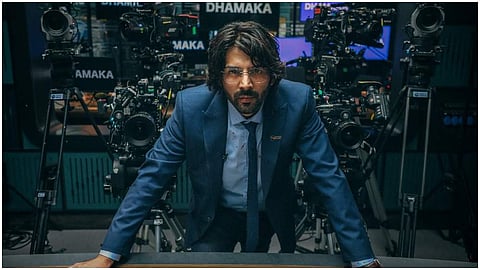

In Dhamaka, Kartik Aaryan plays Arjun Pathak, a news anchor taking a desperate last plunge at success. When a bridge is bombed and the attacker rings up his radio show, Arjun is left with two choices. He can report the crisis honestly or leverage it to his advantage. Coldly calibrated by his boss (portrayed by Amruta Subhash), he plays the humble sensationalist, but finds himself in a moral dilemma.
Remade from a South Korean thriller, The Terror Live (2013), Dhamaka suffers for its inconsistencies and leaps of logic. Praise, though, has gone to Amruta’s entertaining performance, and Kartik’s attempt to play outside his park. We spoke to the team about crafting a thriller and Ram’s unconventional directing style.
Excerpts from a conversation…
Dhamaka is your first thriller and wildly different from your previous work. What got you fired up for this role?
Kartik: I always wanted to work with Ram. When he told me about the character of the news anchor, it just blew my mind. I blindly submitted to him as my director. I hope audiences have gotten to see a new version of me.
Ram, this is your third feature (after Let’s Talk, Neerja) that’s set in a contained environment. Except for a few shots, the story stays within the news studio.
RM: My next film will be set in 10 different locations. Or it could be in an elevator (laughs). In all seriousness, when I made my first film, Let’s Talk, in English, I was hassled by the idea of handling a large production. So I decided to make a film with 10 people including the cast. Since then, as my career picked up, I’ve been using some of those systems — which I call a 360 degree system. In Dhamaka, though you see just a few characters on screen, there are 300 people outside. It also comes from my belief in exploring the landscape of the human face.
Amruta, your performance has become the highlight of the film.
AS: For any actor, to be genuinely surprised by a role is always precious. Ankita, Arjun’s boss, is not someone I could imagine easily. She’s a rich corporate figure, much different from some of my previous characters. It’s only after watching the film that I got to understand her fully.
There’s a long scene where Arjun freaks out and Ankita has to calm him down.
Kartik: It’s one of my favourite scenes. Ram told me to ‘just go for it’. I was repeating one line again and again. Something really bad has happened and my character has to find his normal state. I could only perform because I had Amruta reacting across the glass. Our speaking styles, too, were changing throughout the scene.
Ram: It was like verbal tennis.
Amruta: We were not allowed to rehearse the scene. I would come in and just stare at Kartik. It was something he noticed, like an employee whose boss is eyeing him down. Ram truly creates an atmosphere where the actors are free.
Kartik: He doesn’t even call action or let the lighting department put up thermocol. At one point, he sent a chaiwala into the frame just to see how I react.
Mrunal, your character, Saumya, a reporter and Arjun’s wife, communicates only through news clips. How strange was that to perform?
MT: I have immense respect for journalists, especially crime journalists, for what they do. It’s a crazy job. For Dhamaka, we had more workshops than shooting days. The film was divided into nine chapters. I had a strong sense of the emotional turmoil Saumya was going through in each of them. Even though she’s reporting on camera, there’s a subtle interaction happening between her and her husband. Kartik and I were performing in two units simultaneously. I had an earpiece for my cues. It was all live.
Dhamaka touches on media greed as well as the plight of workers. These are relevant themes in post-pandemic India, though not fully explored in the film.
Ram: For me, any film is pivoted on a simple question: What does a character want and how does he feel when he gets there? Arjun wants to succeed and fulfill his ambition. But when he gets there, he feels bad. Our final song (Khoya Paaya) riffs on that theme. This is all our film is about, the price we pay to get ahead.